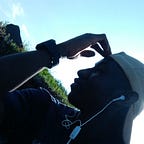On Fathul Bārī and the age of Oblivion
Trivia:
I had been away for so long that seeing students troop in to study filled me with guilt. After an unplanned laundering today, a senior student -- and my study mate -- entered wielding his heavy side-bag. It was some minutes past 2:30 PM and he was there to study and possibly review some past lessons.
On welcoming him and seeing him lay and settle on the mat, I decided to feign weariness and desist from joining the class but guilt wouldn’t allow me -- it’d gotten to the brim and overflowing now. I went into my room and collected my copies of the texts to be studied for the day: Sahīhul Bukhāri, maqāmāt al-harīrī, dawāwīnus sitt and nawāfikhul 'itrīyya amongst others. Settled now, the shaykh came out, we said the 'Asr prayer and proceeded with the day’s lessons.
Knowledge acquisition in such a manner is something I've always admired since my days of yore. 'Karatun Zaure' is what this traditionally Islamic system of pedagogy is called among Hausa-speaking Muslims of Sub Saharan (West) Africa.
While studying with him today, the shaykh narrated to my hearing how he got hold of his (own) copy of Ibn Hajar’s fathul bāri, a monumental work on sahihul bukhari. Back in the day, getting such works in Ghana was nearly an impossible task. He saved for years and sent a trusted student of his on a 500 km journey just to buy them from Cotonou, Benin. He cherished that work so bad and would’ve loved to keep it but poverty had other plans.
Once he got so broke and lost all alternatives that he had to resort to selling some of his collections. This particular work he sold to renovate a place he was moving into as he had experienced a surge in the number of students who visited his Zaure.
His whole account of how poverty somehow deprived him of fully benefiting from the text got me thinking about our age and how from just a tap away such canonical works can be accessed but we seem to be oblivious, generally ignorant and seemingly unmotivated.
Addendum:
How do you assess our generation when it comes to the pursuit of sacred knowledge? Are we doing better or worse than past generations despite the proliferation of resources and innovative means of knowledge acquisition?
______________________________________________
